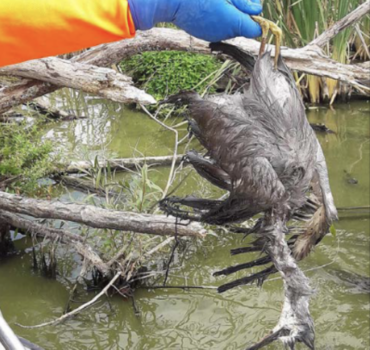
Another maggot-infested shag carcass is pulled out of LaKe Ngaroto

Another maggot-infested shag carcass is pulled out of LaKe Ngaroto
A Fish and Game manager is challenging councillors to spend time with him at the scene of what he calls the region’s latest environmental disaster.
David Klee, Game Bird Manager for the Auckland/Waikato Fish and Game Council has penned an open letter about Lake Ngaroto – which he likens to an effluent pond.
Thousands of fish and birds have died this year in the lake. Now he is challenging Waipā District Councillors and decision makers to meet him at the lake. “When you are seeing the carnage unfolding, it’s a bit different, it becomes more real,” he said.
Klee, who has been in the Hamilton office for 12 years and specialises in lake ecology says the problem has built up over years and “you can’t just go round the edges – it’s a big job”.
In his open letter he wrote “I have been getting feedback that apparently some local body officials hold the belief that: hey, it’s a dry year and shallow lake, these things happen in these environments, it’s part of a natural cycle. So, if you read this and hold that belief, this letter is addressed to you.”
He says the lakes do not naturally have nutrient levels “off the charts and get cyanobacterial blooms with cell counts high enough to kill a dog if they took a drink”.
“Second, these lakes do not naturally go anoxic (without oxygen) for days, causing even the hardiest fish species such as koi carp, goldfish and eels to die on mass. Third, these lakes do not naturally get botulism outbreaks that will likely kill the birds that inhabit them.”
He says these are symptoms of highly degraded ecosystems, “and in fact, the only places where such events regularly occur are town effluent ponds”.
“That is the current state of Lake Ngaroto. These issues also don’t just happen overnight; they are due to the systemic failure of our institutions to set and implement appropriate policy and rule frameworks to safeguard our freshwater ecosystems.”
David Klee recounted a visit to the lake where he talked to the Waipā District Council’s new contractor.
“As he was retrieving another week-old maggot-infested shag carcass with a stomach full of decaying fish, I could see the gag reflex starting to kick in, and I thought whatever he’s getting paid, it’s not enough.
“In amongst the dead and dying mallard ducks, we found dead grey teals, black shags, little black shags, a heron, and we even flushed an Australasian bittern, a critically endangered species. It made it to the other side of the lake. Hopefully, it will move on to cleaner water elsewhere.”D
avid Klee said his letter was not designed to “put the boot in”.
“Council staff are doing great things; they are keen and passionate. Individual landowners are doing a good job, planting and fencing streams.“But the science is clear – if you fence streams while increasing fertiliser use and stock levels, the quality of the water will still get worse.”
He warned that the cost of restoring lakes in a condition like Ngaroto grows exponentially.
Nearby Lake Serpentine (Rotopiko) looked in good condition, but “the science says most of our lakes are going backwards”.
“I hope councillors take me up on my offer, we need an incentive to make change.”
David Klee can be reached through the Forest and Game website.








